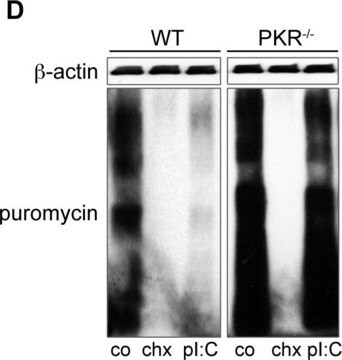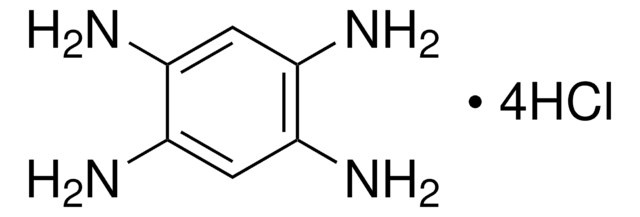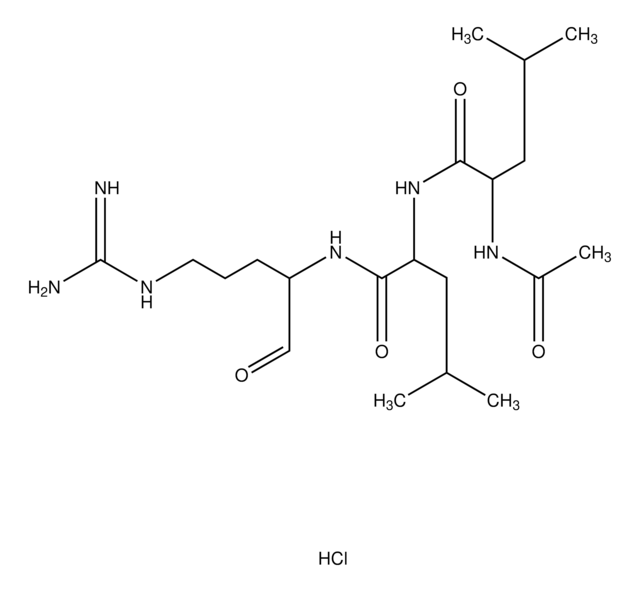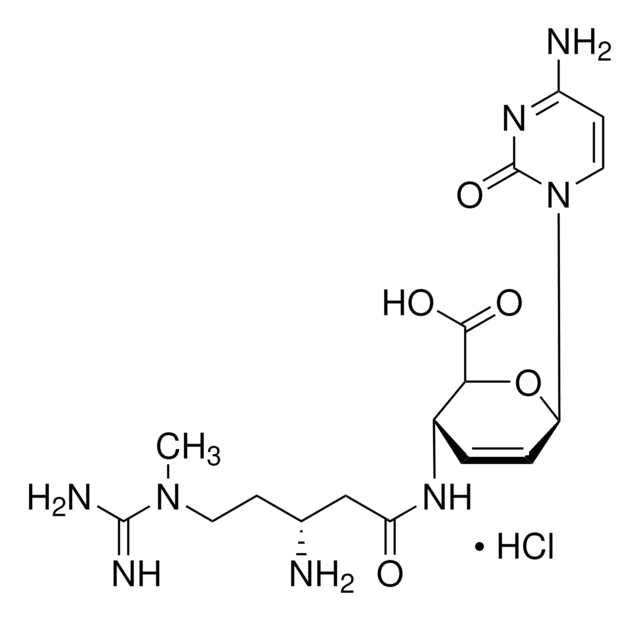P7255
Puromycine dihydrochloride from Streptomyces alboniger
≥98% (HPLC), powder
Synonyme(s) :
3′-[α-Amino-p-méthoxyhydrocinnamamido]-3′-déoxy-N,N-diméthyladénosine dihydrochloride
About This Item
Produits recommandés
Niveau de qualité
Pureté
≥98% (HPLC)
Forme
powder
Score du produit alternatif plus écologique
old score: 88
new score: 79
Find out more about DOZN™ Scoring
Caractéristiques du produit alternatif plus écologique
Atom Economy
Design for Energy Efficiency
Use of Renewable Feedstocks
Design for Degradation
Learn more about the Principles of Green Chemistry.
sustainability
Greener Alternative Product
Solubilité
H2O: 50 mg/mL
Spectre d'activité de l'antibiotique
Gram-positive bacteria
neoplastics
parasites
Autre catégorie plus écologique
Mode d’action
protein synthesis | interferes
Température de stockage
−20°C
Chaîne SMILES
Cl.Cl.COc1ccc(C[C@H](N)C(=O)N[C@H]2[C@@H](O)[C@@H](O[C@@H]2CO)n3cnc4c(ncnc34)N(C)C)cc1
InChI
1S/C22H29N7O5.2ClH/c1-28(2)19-17-20(25-10-24-19)29(11-26-17)22-18(31)16(15(9-30)34-22)27-21(32)14(23)8-12-4-6-13(33-3)7-5-12;;/h4-7,10-11,14-16,18,22,30-31H,8-9,23H2,1-3H3,(H,27,32);2*1H/t14-,15+,16+,18+,22+;;/m0../s1
Clé InChI
MKSVFGKWZLUTTO-FZFAUISWSA-N
Vous recherchez des produits similaires ? Visite Guide de comparaison des produits
Description générale
Application
Actions biochimiques/physiologiques
Mode de résistance : La puromycine acétyltransférase est un gène de résistance efficace.
Spectre antimicrobien : Ce produit est actif contre les micro-organismes à Gram positif, moins actif contre les bacilles acidorésistants et faiblement actif contre les micro-organismes à Gram négatif. La puromycine peut empêcher la croissance des bactéries, protozoaires, algues et cellules de mammifères et agit rapidement, tuant 99 % des cellules dans un délai de 2 jours.
Caractéristiques et avantages
Attention
Notes préparatoires
Autres remarques
Mention d'avertissement
Warning
Mentions de danger
Conseils de prudence
Classification des risques
Acute Tox. 4 Oral
Code de la classe de stockage
11 - Combustible Solids
Classe de danger pour l'eau (WGK)
WGK 3
Point d'éclair (°F)
Not applicable
Point d'éclair (°C)
Not applicable
Équipement de protection individuelle
dust mask type N95 (US), Eyeshields, Gloves
Certificats d'analyse (COA)
Recherchez un Certificats d'analyse (COA) en saisissant le numéro de lot du produit. Les numéros de lot figurent sur l'étiquette du produit après les mots "Lot" ou "Batch".
Déjà en possession de ce produit ?
Retrouvez la documentation relative aux produits que vous avez récemment achetés dans la Bibliothèque de documents.
Les clients ont également consulté
Articles
Protein synthesis is a complex, multi-step process involving many enzymes as well as conformational alignment. However, the majority of antibiotics that block bacterial protein synthesis interfere with the processes at the 30S subunit or 50S subunit of the 70S bacterial ribosome.
Notre équipe de scientifiques dispose d'une expérience dans tous les secteurs de la recherche, notamment en sciences de la vie, science des matériaux, synthèse chimique, chromatographie, analyse et dans de nombreux autres domaines..
Contacter notre Service technique











